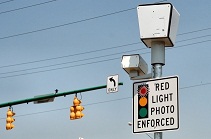
Red light ticket cameras at intersections are becoming more prevalent with the technological innovations like enhanced imaging making traffic cams less prone to errors. The reasons many municipalities cite for using such technology is the perceived reduction in traffic accidents and fatalities at high-risk intersections.
However, these cameras are also coming under increased scrutiny due to a variety of other factors such as:
Timeliness. Some red light runners didn't receive a ticket until more than a month after the incident for which they were ticketed occurred.
Fairness. Opponents claim this technology has little or no effect on overall safety and is nothing more than a way for localities to raise additional revenue.
Privacy issues. Despite technological advances, these cameras are unable to clearly discern the driver of a vehicle; instead tickets are issues to the registered owner.
Effectiveness. While studies show that there is a decrease in some types of traffic accidents such as right-angle crashes, there was actually an increase in rear-end collisions and an overall increase in accidents that resulted in injury.
The profit motive. Opponents argue that private companies who provide this technology are more concerned with making money than with public safety.
It's the profit motive that has the anti-camera and citizen's rights groups up in arms.
Many members of the general public assume that the cameras are property of the locality in which they are used and that the funds received go back into the community. The truth is that less than 20 percent goes to the municipality while the remaining goes to the service provider.
Consumer groups argue that the expense of using this technology in already difficult economic times isn't justified by the relatively low incidences of traffic violations captured in the areas where they are used. They're also suspicious of studies purporting to show wide public support of red light cameras, as these studies are largely funded by the service providers themselves.

In the spirit of the public's right to know, here are the top 3 private companies that make money from red light tickets. These are the names (companies) mentioned mostly in connection with profit motive and their business practices with regard to red light cameras. Some of their affiliations may surprise you.
This Arizona-based company bills itself as "a leading provider of technology enabled business and service solutions for Road Safety Camera operations." What they don't tell the public is that one-third of the company is owned by Goldman Sachs, or that they keep up to 86 percent of the profit on their red light cams. Critics say ATS, Inc. is getting rich while the municipalities they supply are barely breaking even after expenses.
They made headlines recently concerning a lawsuit filed jointly against them and the City of West Palm Beach, Florida concerning the Constitutionality of their traffic cams. The case was decided in their favor. ATS currently supplies more than 3,000 red light cams to 28 states and parts of Canada.
2. Redflex Traffic Systems
Phoenix, Arizona-based Redflex is second after ATS, Inc. as a provider of red light cameras, with more than 2,000 of the devices placed in cities across the United States and Canada. Their revenues totalled more than $92 million in 2011. The company keeps up to 88 percent of the proceeds from traffic violations caught using its equipment.
It was recently at the center of a controversy in the town of Cary, North Carolina, where it was discovered that in one intersection alone, 31 false violations were reported. The city has since cancelled its contract with Redflex.
3. Affiliated Computer Services
This former Fortune 500 Company is a subsidiary of the Xerox Corporation. It is based out of Dallas, Texas and now operates in over 100 countries. Its annual revenue is in the billions, and it was the subject of an SEC investigation in 2005 due to the unethical business practices of its then-CEO, Mark King and CFO Warren Edwards, who both resigned.
The company was bought out by Xerox in 2010 and provides red light cams to cities all over North America through its Transportation Solutions Group.
Though any idea that helps foster public safety is a good one, the true motives behind the development and use of red light cameras, backed up by data that suggests that they are not an effective deterrent, calls their necessity into question. At the very least, citizens have a right to know that these companies are making millions from this service at the expense of not-so-aware public.







